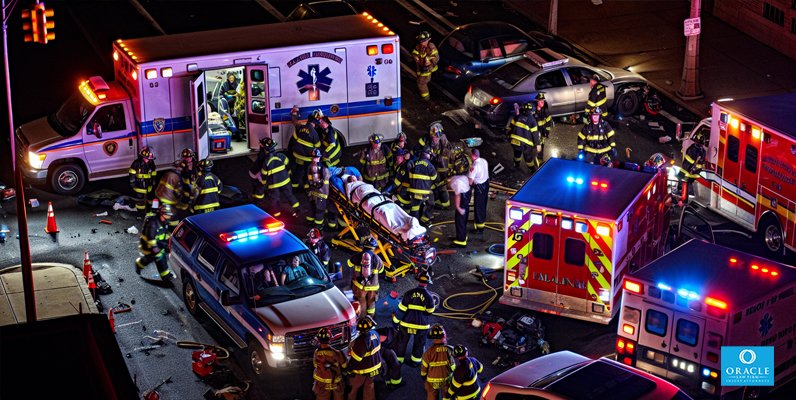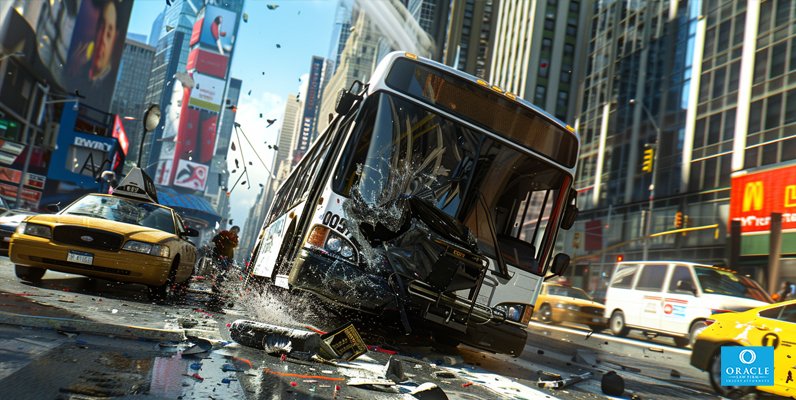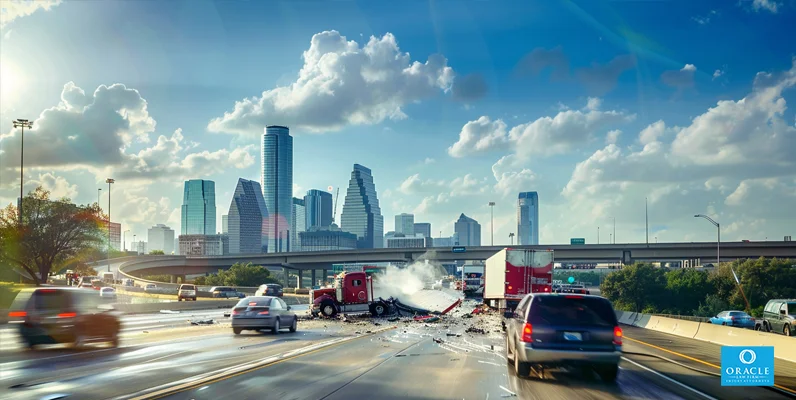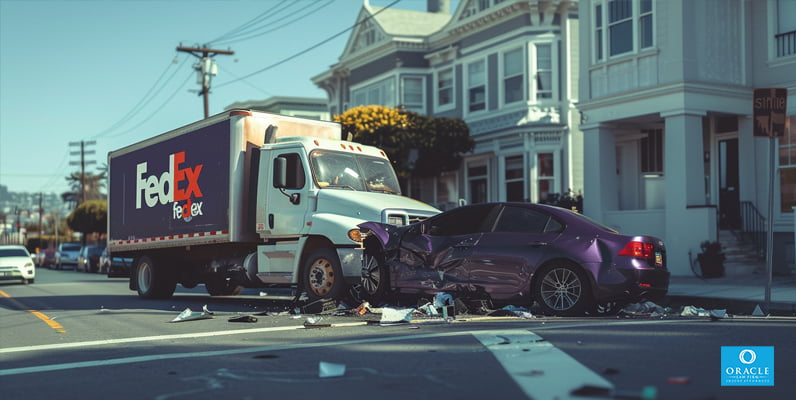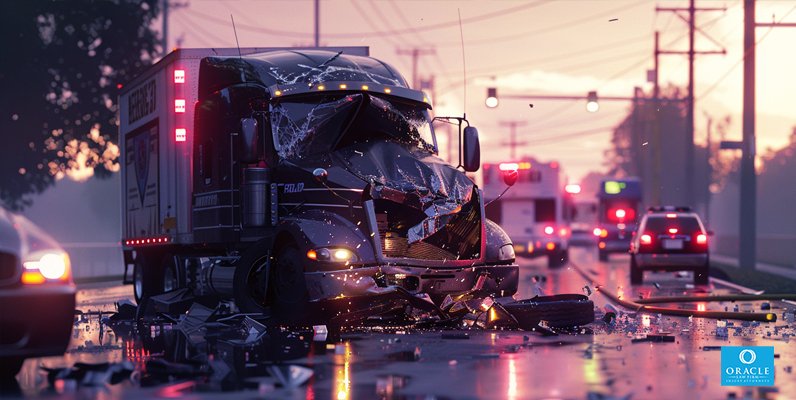What legal rights do you have after a car accident with death? From the crucial first steps to filing a wrongful death claim, this article takes you through the necessary actions, helping you understand your rights, the possibility of criminal charges against the at-fault driver, and how to seek necessary compensation.
Key Takeaways
- A detailed investigation following a fatal car accident is crucial for gathering evidence and determining the cause, which aids in filing wrongful death claims and identifying the at-fault party.
- Eligibility for filing a wrongful death claim typically includes court-appointed executors, spouses, or domestic partners, and compensation pursued can include both economic and non-economic damages.
- Statutes of limitations impose critical time constraints on wrongful death lawsuits, which vary by jurisdiction, and failing to adhere to these timelines can forfeit the right to legal action.
Immediate Steps Following a Fatal Car Accident
The immediate aftermath of a fatal car accident is a whirlwind of activity. Emergency personnel swiftly respond to the scene to provide urgent medical attention to those in need and ensure the area’s safety. Meanwhile, the grim task of verifying death falls upon these professionals, who meticulously record observations and establish the cause of death.
Parallel to these actions, the difficult responsibility of informing the family of the deceased rests with law enforcement or medical personnel. Timely communication allows the family to begin the grief process and start considering their legal options, such as filing a wrongful death claim, which is where a car accident lawyer can provide invaluable guidance.
The Investigation Process After a Deadly Car Accident
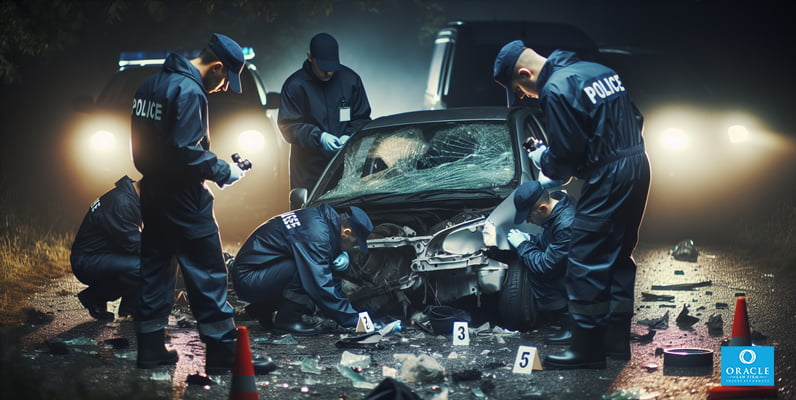
Following the immediate response, a meticulous investigation ensues. This process aims to gather data and information to analyze and identify the accident’s probable cause. Such information is vital for legal proceedings and families grappling with medical bills and other accident-related expenses.
Law enforcement agencies, witnesses, and the parties involved in the accident all play pivotal roles in the investigation. The task involves:
- Conducting interviews
- Gathering evidence
- Documenting vehicle damage
- Capturing photographs of the accident scene
All these steps aid in collecting and analyzing evidence, reconciling conflicting witness testimonies, and gathering details about the vehicles involved in the accident.
The evidence gathered helps to ascertain the causes and contributing factors of the fatal car crash, thereby laying a solid foundation for any subsequent wrongful death claims.
Identifying the At-fault Party in a Fatal Auto Accident
The detailed process of identifying the at-fault party in a fatal auto accident entails:
- Scrutinizing the accident scene
- Reviewing police records
- Compiling witness statements
- Collecting evidence
Evidence such as the examination of the accident scene, police records, witness accounts, and the analysis of the force and direction of impact through dents and broken parts is utilized to ascertain the at-fault party. The process is further detailed in the following subsections, focusing on the role of traffic laws and the impact of mechanical failure in determining fault.
The Role of Traffic Laws in Determining Fault
Traffic laws play a significant role in fatal car accident investigations and in determining the at-fault party. If a driver is found to have violated a traffic law, they are likely to be considered at fault. Violations such as:
- speeding
- running a red light
- failure to yield
- improper lane change
are often linked to fatal car accidents and can significantly influence the determination of fault.
The process of determining fault based on traffic laws involves:
- Claims adjusters who conduct interviews with witnesses
- Analyzing police reports
- Assessing accounts of the accident
- Evaluating photos of vehicle or property damage
Traffic laws play a substantial role in motor vehicle accident investigations by providing essential guidelines for determining fault, identifying moving traffic violations, and issuing citations or warnings.
How Mechanical Failure May Influence Liability
Mechanical failures can be a significant factor in fatal car accidents, often leading to a loss of vehicle control and, ultimately, a fatal accident. In such cases, when someone dies in a car accident, the responsibility may lie with the manufacturer or mechanic who neglected to maintain or repair the vehicle properly rather than the driver.
Establishing fault and responsibility in a lawsuit involving mechanical failure can be challenging. According to comparative fault laws, multiple parties, such as the manufacturer, the mechanic, or the vehicle owner, may be deemed accountable for a mechanical failure accident. Seeking guidance from a car accident lawyer is crucial for managing the legal consequences.
Filing a Wrongful Death Claim: Who is Eligible?
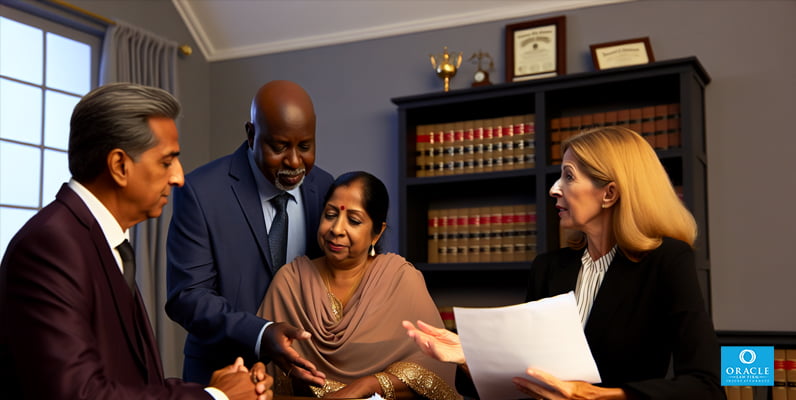
The filing of a wrongful death claim is an essential step toward achieving justice and compensation for the loss of a loved one in a fatal car accident. Usually, court-appointed executors or personal representatives, spouses, or registered domestic partners of the deceased are eligible to initiate a wrongful death claim, although this can vary by jurisdiction.
The essential legal requirements for initiating a wrongful death claim encompass:
- Establishing that the death was a result of another party’s negligence or intent to cause harm
- Demonstrating the monetary damages suffered by surviving family members
- Ensuring that the claim is submitted within the prescribed timeframe set by the state, typically one or two years from the date of death.
In some instances, individuals who were financially dependent on the deceased may meet the criteria to file a wrongful death claim, even if they are not immediate family members.
Seeking Financial Compensation After Losing a Loved One
Following a loved one’s death in a fatal car accident, families are often confronted with substantial financial hardship. Pursuing financial compensation can help ease some of these burdens. The process includes:
- Contacting a legal representative
- Determining eligibility
- Identifying the statute of limitations
- Gathering pertinent evidence
Compensation in a wrongful death claim can be divided into economic and non-economic damages. The economic impact of a loved one’s death in wrongful death claims is determined by aggregating the economic damages, encompassing loss of earnings and financial support that the deceased would have contributed. On the other hand, non-economic damages encompass losses that are not quantifiable in monetary terms, such as grief, sorrow, and emotional distress. These damages are further detailed in the following subsections.
The Economic Impact of a Loved One’s Death
The economic impact of a loved one’s death is tangible and often immediate. Typical expenditures that families face include the cost of a funeral, which averages around $7,848 in the United States, and medical costs associated with a fatal car accident.
Apart from these immediate costs, the loss of income is a significant factor. Factors such as the deceased’s age, occupation, education, and projected career trajectory are considered while calculating the loss of income. When the primary earner is lost, the financial impact on a family can be substantial, leading to a reduction in total income, heightened financial difficulties, and potential loss of benefits.
Non-Economic Damages: Valuing the Immeasurable Loss
Non-economic damages, while harder to quantify, are no less significant. These damages represent the emotional and psychological toll of losing a loved one. In a wrongful death case, non-economic damages encompass losses that are not quantifiable in monetary terms, such as grief, sorrow, and emotional distress.
The types of non-economic damages that may be pursued after the loss of a loved one in a fatal car accident encompass the mental anguish experienced by the deceased and surviving loved ones, as well as the pain and suffering endured. Calculating non-economic damages involves evaluating the extent and duration of the victim’s injuries and the impact on the victim’s overall quality of life.
Legal Representation: Partnering with a Car Accident Attorney
The bereaved families often find the legal intricacies of a wrongful death claim overwhelming. In such cases, a car accident attorney can:
- Offer expertise and advocacy
- Assist with paperwork
- Navigate legal complexities
- Provide support during legal proceedings
An experienced car accident attorney can assist in:
- Determining the responsible party by conducting an investigation into the accident’s circumstances and identifying the at-fault driver
- Advocating for the victim’s rights in any legal proceedings that may ensue
- Managing communication with insurance companies
- Examining insurance policies for pertinent coverage
- Collecting essential evidence
- Aiding in establishing fault to secure fair compensation for the family’s loss
The benefits of a free consultation with a wrongful death lawyer will be explored in the following subsection.
The Benefits of a Free Consultation with a Wrongful Death Lawyer
A free consultation with a wrongful death lawyer can offer invaluable knowledge of the legal process. During this consultation, families can gain an understanding of their rights and learn about the potential actions they can take in their legal journey.
A complimentary consultation with a wrongful death attorney contributes to understanding the potential compensation by offering valuable legal guidance, evaluating the potential compensation according to the case’s particulars, and comprehending the lawsuit’s strength. During a complimentary consultation with a wrongful death attorney, typical subjects addressed include:
- the attorney’s experience in handling wrongful death lawsuits
- evaluating the case’s strength
- understanding state laws
- fee discussions
- evidence collection process
- documenting damages
- estimating total costs
- outlining recoverable damages, such as funeral expenses, lost wages, future earnings, medical expenses, guidance loss, companionship, and punitive damages.
Time Constraints on Filing a Wrongful Death Lawsuit
Legal proceedings following a fatal car accident are subject to strict time constraints, known as the statute of limitations. The prescribed time limit for initiating a wrongful death lawsuit varies from state to state, typically ranging from one year to potentially more, depending on the jurisdiction.
These timeframes usually commence at a specific time stipulated by state law, which may not necessarily be immediately following the death. It is often calculated from the date of death or the identification of the cause of death. Failure to meet the deadline for submitting a wrongful death lawsuit could result in the forfeiture of your right to pursue legal action, ultimately ending your case and eliminating your chance to seek recompense for your loss.
Under specific circumstances, such as when a government entity is at fault, the statute of limitations could be extended for up to four years.
The Potential for Criminal Charges After a Fatal Car Crash
Sometimes, a fatal car accident can lead to criminal charges being filed against the at-fault driver, depending on the circumstances of the accident and the level of negligence involved. Potential criminal charges for a fatal car accident may encompass:
- Misdemeanor or felony charges
- Allegations of reckless driving
- Allegations of negligence
- Manslaughter
- Vehicular homicide
Criminal negligence in a fatal car accident can be established when an individual reaches a level of negligence deemed criminally negligent for the collision. Instances of criminal negligence may involve actions such as:
- driving under the influence
- exhibiting road rage
- intentionally damaging someone’s vehicle
- discharging firearms in traffic
- dropping objects onto the road
Not all fatal accidents lead to criminal charges, and the decision to file charges depends on the nature of the crash and the injuries involved.
Dealing with Insurance Companies in the Wake of a Fatal Accident

Following a fatal accident, interactions with insurance companies can be complex and intimidating. These companies often employ strategies to reduce payouts, making diligent negotiations essential. Patience is key in this process, along with declining initial offers, keeping a detailed record of all damages, evaluating the pros and cons of the insurance company’s offer, and understanding the full value of your claim.
Having a car accident attorney by your side can make this process significantly smoother. They can:
- Manage communication with insurance companies
- Examine insurance policies for pertinent coverage
- Collect essential evidence
- Aid in establishing fault to secure fair compensation for the family’s loss.
Understanding Survivor Claims and Estate Claims

In the aftermath of a fatal car accident, the family of the deceased has two primary legal avenues to pursue: survivor claims and estate claims. Survivor claims pertain to the legal claims that may be pursued by the surviving spouse, child, or parent of the deceased to seek damages arising from the accident.
On the other hand, estate claims are claims initiated by the deceased individual’s estate. In situations where the insurance coverage of the deceased driver is insufficient to cover the damages, the estate may bear responsibility for the outstanding amount. These two types of claims allow the family to seek compensation for different aspects of their loss, and understanding the differences between them can be crucial in ensuring a fair outcome.
Summary
Navigating the legal aftermath of a fatal car accident can be a daunting task. From understanding the immediate steps following the accident through the investigation process and identifying the at-fault party to filing a wrongful death claim and seeking financial compensation, each step is vital in the pursuit of justice and fair compensation. Partnering with a car accident attorney can provide invaluable legal expertise, guidance, and support throughout this complex process. Understanding these key aspects can pave the way for healing and justice despite the grief and pain.
Frequently Asked Questions
What is the usual cause of death in a car accident?
The usual causes of death in car accidents are traumatic brain injuries, internal bleeding, broken ribs, and spinal cord injuries. These injuries are common and can be fatal in car accidents.
What car is most likely to survive a crash?
The safest type of car in an accident is one with a high safety rating and advanced safety features. Choose a car with good crash test results and advanced safety technology.
What happens to the body when someone dies at the scene of an accident?
When someone dies at the scene of an accident, their body is transported to the local morgue by the coroner for further investigation into the cause of death.
What is the sentence for an accident involving death or personal injury in CA?
In California, if an accident involving death or personal injury occurs due to a violation, the person committing the offense will face a felony of the second degree, with a minimum prison term of two years and a mandatory minimum fine of $2,500.
What is it called when someone dies in an accident?
When someone dies in an accident, it is called an accidental death. Accidental death is an unnatural death caused by an accident, such as a slip and fall, traffic collision, or accidental poisoning.
